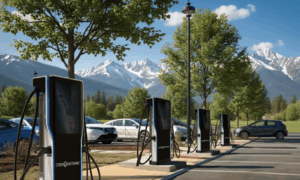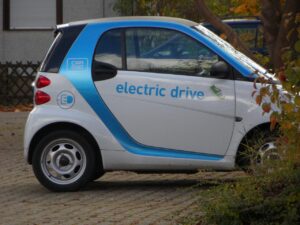
Home / EV Charging News / Hybrids vs. Electric Cars: Understanding the Key Differences
As the world shifts towards more sustainable transportation, both hybrid and electric vehicles (EVs) have gained significant popularity. These vehicles offer alternative options to traditional gasoline-powered cars, promising lower emissions, improved fuel efficiency, and, in the case of EVs, a complete elimination of fossil fuel dependency. However, despite their growing presence on the road, many people are still unclear about the fundamental differences between hybrids and electric cars. This article aims to clarify these differences, helping potential buyers make an informed decision.
A hybrid car combines a traditional internal combustion engine with an electric motor. This dual-power system allows hybrids to switch between or combine both power sources to optimize fuel efficiency.
There are several types of hybrid vehicles, including:
Hybrid vehicles typically use regenerative braking to recharge their batteries, capturing energy that would otherwise be lost during braking.
An electric car, or Battery Electric Vehicle (BEV), is powered entirely by electricity stored in a battery. Unlike hybrids, EVs do not have an internal combustion engine and therefore produce zero tailpipe emissions. There are also Plug-In Hybrid Electric Vehicles (PHEVs), which can operate as either a pure electric vehicle or a hybrid, depending on the battery charge and driving conditions.
Electric vehicles use large battery packs, which can be recharged at home or public charging stations. The range of an EV is largely determined by the size of its battery, with most modern EVs offering between 150 to 400 miles on a single charge.
The primary difference between hybrids and electric cars lies in their power source. Hybrids rely on a combination of gasoline and electric power, allowing them to offer greater flexibility in terms of fuel efficiency and range. They are particularly advantageous for drivers who frequently travel long distances, as they can switch to gasoline when the electric battery is depleted.
On the other hand, electric cars run exclusively on electricity. This means they produce zero tailpipe emissions and deliver instant torque for smooth, rapid acceleration. However, EVs are limited by their battery range and require access to charging infrastructure to replenish their energy.
When comparing the environmental impact, electric vehicles have a clear advantage over hybrids. EVs produce no tailpipe emissions, making them a more environmentally friendly option, especially when charged with renewable energy sources. Hybrids, while more efficient than traditional gasoline vehicles, still emit greenhouse gases when operating on their gasoline engine.
However, the production and disposal of batteries used in both hybrids and EVs do have environmental implications. The long-term sustainability of these vehicles will depend on advancements in battery technology, such as improved recycling processes and the development of less resource-intensive batteries.
The cost of purchasing a hybrid or electric car can vary significantly. Generally, hybrids are less expensive upfront than electric vehicles due to their smaller battery size and the continued reliance on a gasoline engine. However, electric vehicles often come with government incentives and rebates that can help offset their higher purchase price.
Over the long term, EVs tend to have lower operating costs. Electricity is cheaper than gasoline, and electric cars have fewer moving parts, resulting in lower maintenance costs. Hybrids still require regular maintenance for their internal combustion engines, which can add to the overall cost of ownership.
One of the advantages of hybrid vehicles is the convenience of gasoline refueling. Drivers can quickly fill up at any gas station, making hybrids a practical choice for those who frequently drive long distances or live in areas with limited access to charging infrastructure.
Plug-in hybrids (PHEVs) offer the additional benefit of being able to charge their batteries at home or at public charging stations, allowing for short electric-only trips. However, when the battery is depleted, the vehicle will switch to gasoline, providing a safety net for longer journeys.
Electric vehicles require charging, which can be done at home, work, or public charging stations. There are three levels of charging:
Range Anxiety: One of the main concerns for potential EV buyers is range anxiety—the fear of running out of battery power before reaching a charging station. While most modern EVs offer sufficient range for daily commuting, long road trips may require careful planning to ensure access to charging points. Hybrids, with their gasoline engines, do not suffer from this limitation, making them more versatile for long-distance travel.
Driving Comfort and Noise: Electric vehicles are known for their quiet operation, thanks to the absence of an internal combustion engine. This creates a serene driving experience, particularly in urban environments. Hybrids, while quieter than traditional cars, still produce some noise when the gasoline engine is running. Additionally, EVs often provide a smoother ride due to their instant torque and simplified powertrain.
Understanding the key differences between hybrids and electric cars is essential for making an informed decision. While both offer environmental and economic benefits over traditional gasoline vehicles, your choice will depend on factors such as driving range, cost, and access to charging infrastructure. Whether you opt for the versatility of a hybrid or the clean efficiency of an electric car, both represent a significant step towards a more sustainable future.



